Check out an average grocery store - and see what stories it has to tell.
By Yasmine Shemesh
June 16, 2015
Original Haaretz article posted at:
bit.ly/israeli-grocery-stores
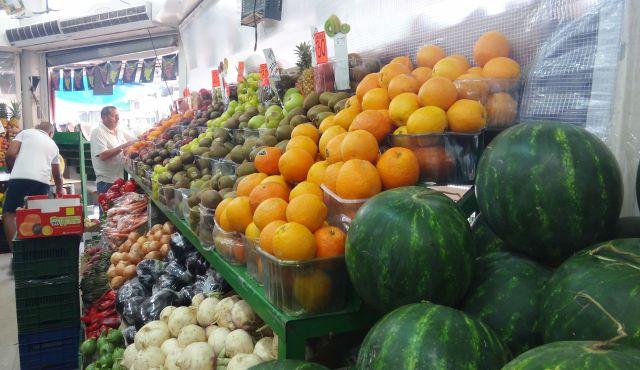
Fruit for sale at an Israeli supermarket.
Photo by Yasmine Shemesh
One of the most rewarding things about travel is immersing oneself in the flavors of a different culture. Wandering the isles of a typical grocery store in a new locale can provide an insightful window into its roots and customs.
Like its residents, Israel is a bright place of many flavors. With a diverse array of products based on the region's traditional cuisines, influenced by kosher dietary laws and the country's immigrants, the shelves of Israeli grocery stores are filled with reflections of the land, its people and their histories. Here are 10 things to look out for in the grocery store.
1. The hummus case
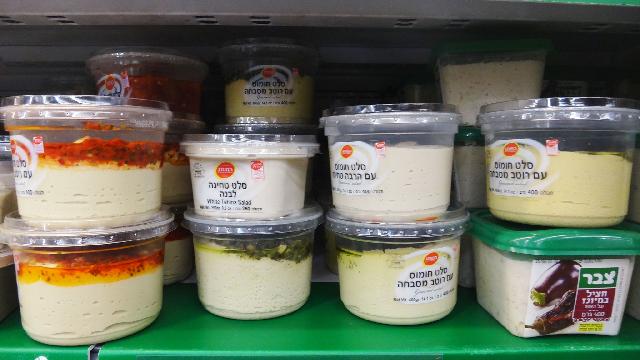
Hummus for sale at an Israeli supermarket
Photo by Yasmine Shemesh
This Levantine spread made from chickpeas, tahini, olive oil, lemon juice, salt and garlic is a staple of Israeli cuisine and, as you might expect, Israeli grocery stores are stacked with the stuff. But while there's a large variety of styles and flavors, it's not Western-style hummus - you won't find any white bean paste or avocado in Israeli supermarket hummus. In Israel, hummus is all about tradition. Hummus often comes plain, and if it's flavored, it's with traditional seasonings such as lemon, olive, hot peppers or onion.
Nearly every hummus restaurant from Jerusalem to Jaffa makes it their own way, based on cultural or family tradition, so the spread can vary broadly in texture and taste, from creamy to nutty to spicy. Israel's commercial hummus manufacturers try to capture this by partnering with some of the country's best known hummus restaurants, offering different products ostensibly made based on these unique recipes.
2. Hashachar Ha'oleh
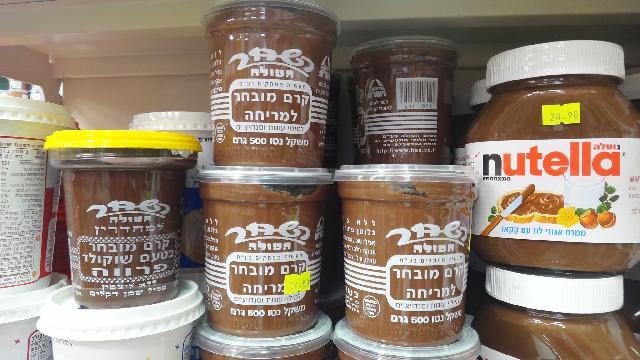
Hashahar, Israel's answer to Nutella
Photo by Yasmine Shemesh
You can indeed find Nutella here, but when in Israel, do as the Israelis do and grab some Hashachar Ha'oleh: the local chocolate spread of choice.
Hashachar Ha'oleh, whose name means "rising dawn" in Hebrew, dates back to the 1950s. Hashachar Ha'oleh is now also sold in 12 countries outside of Israel, including the United States, Canada, England and Australia.
3. The olive/pickle bar
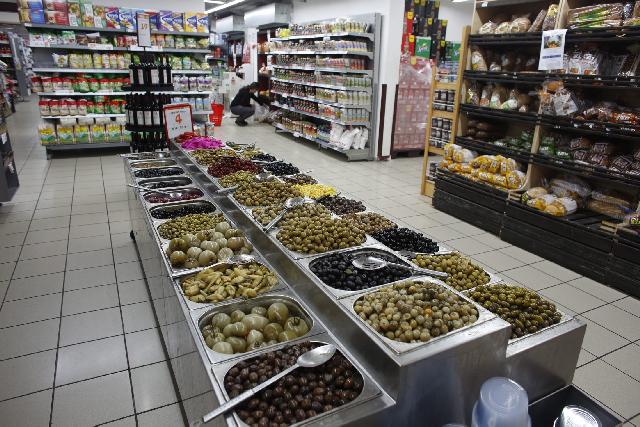
Olive and pickle bar.
Photo by Daniel Bar-On
Many Israeli supermarkets offer a self-serve olive and pickle station, instead of a salad bar. Customers can choose from a wide variety of olives and pickled vegetables, including eggplant, carrots, cabbage, cauliflower and lemon.
Pickled cucumbers, particularly crunchy kosher dills, are closely associated with Jewish fare, but they're also popular among the Arab community. Other types of pickled vegetables, such as cabbage, eggplant and squash, are also products of the ethnicities that make up Israeli society - take for example pickled vegetables seasoned with amba, the bright yellow mango-fenugreek chutney brought over by Iraqi Jews.
4. Seasonal/exotic fruits
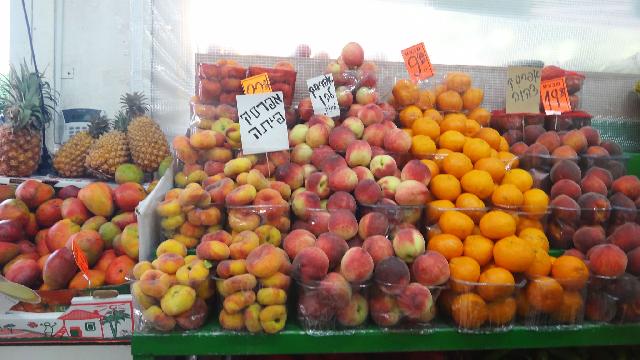
Fruit for sale at an Israeli supermarket.
Photo by Yasmine Shemesh
One of the first things that you may notice when you walk into an Israeli grocery store are the towering mounds of fruit. Some still have a layer of dirt on them.
Israel is a farming powerhouse, exporting produce and also producing it for the local market. Local farmers grow more than 40 varieties of fruit, including your common bananas, pomegranates and apples, as well as fruits that foreigners may not recognize, such as prickly pear, persimmon and loquat.
However, most fruits in Israel tend to be available only when they're in season. Strawberries are a winter/spring fruit; avocados and apricots peak in late spring. Plums, peaches and melons are at ripest in the summer, and dates are sweetest in the fall.
5. Bourekas

Bourekas.
Photo by Doram Gaunt
No, those aren't croissants or strudels cooling on the racks, but bourekas - baked phyllo pastries stuffed with a variety of ingredients from potato to chocolate. Bourekas were brought over by Balkan Jews, and are extremely popular in Israel.
Most bourekas are made with margarine, not butter, so observant Jews can eat them with meat dishes. Savory fillings include potato, spinach, cheese and leek, while sweet versions can be packed with chocolate, halva or vanilla cheese.
6. Ethnic foods in the frozen section
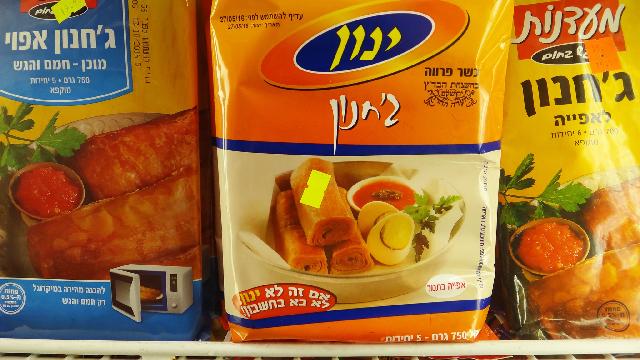
Jachnun in the frozen section at an Israeli supermarket.
Photo by Yasmine Shemesh
Israel has plenty of ethnic food, but it's not the Indian or Mexican commonly found in some Western nations. As in many countries, food in Israel is influenced by its immigrant groups.
To see what that means, take a look at the frozen food aisle of any large grocery. You’ll find various types of kubbeh, cracked wheat dumplings stuffed with minced meat and spices, a Middle Eastern dish popular in places like Turkey and Syria, but often associated with the Kurdish and Iraqi Jewish communities in Israel; and Yemenite breads like malawach, a flat puff pastry that's pan fried, and jachnun, flaky rolls that are baked overnight for Shabbat.
7. Halva
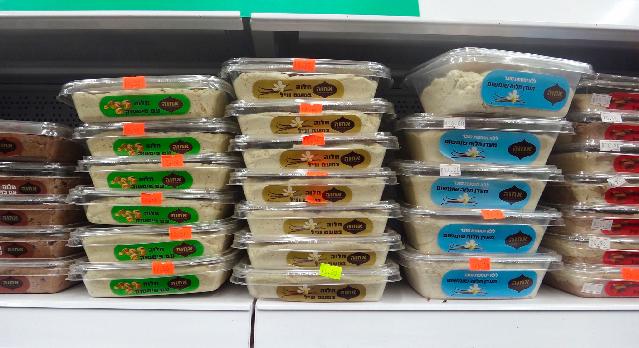
Halva
( Photo by Yasmine Shemesh
Looking for something sweet? Make your way over to the dessert isle and pick up one of the many varieties of halva on offer. This thick confection is found throughout the Middle East, North Africa and even Southern, Central and Western Asia. In Israel, it is made of sesame and often sold in slabs or bars. It comes in an assortment of flavors, including chocolate and vanilla.
8. Bamba
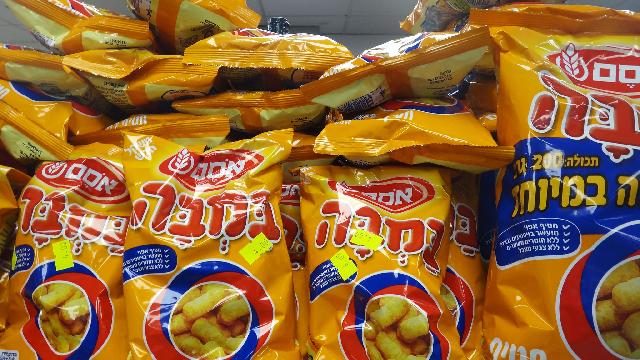
Bamba
Photo by Yasmine Shemesh
Bamba is perhaps the quintessential Israeli snack. Think of it as a peanut-flavored version of Cheese puffs. Israeli children have been growing up on the snack since the early 1960s, and some 90% of Israeli households report that they buy it regularly. Nowadays bamba is gaining international renown as studies indicate that early peanut exposure may well be the reason that the peanut allergy rate in Israel is so low compared to that in Western nations.
There are many varieties of bamba available - bamba filled with halva and nougat, strawberry-flavored sweet bamba, and even a new, eyebrow-raising product - bamba stuffed with punch and banana-flavored cream.
9. Milk and meat deli counters
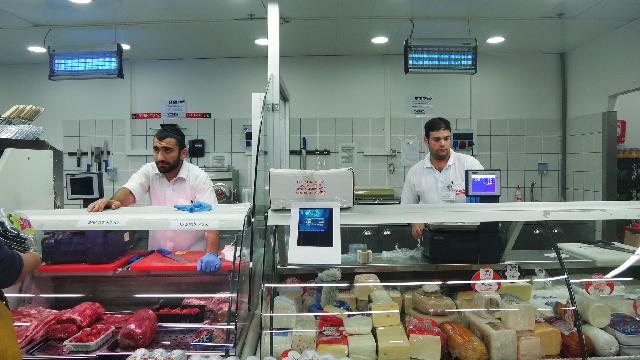
Milk and meat deli counters at an Israeli supermarket.
Photo by Yasmine Shemesh
Most of Israel's grocery stores are kosher, meaning they conform to traditional Jewish dietary restrictions. In light of this, they're generally outfitted with two deli counters - one for milk, and one for meat. Often they're side by side, but with a divider down the middle.
10. Tivall
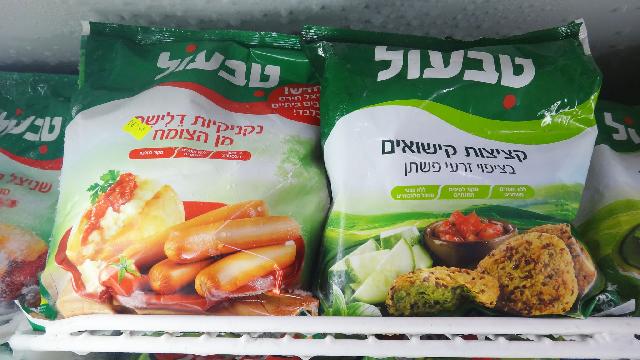
Tivall schnitzel - vegetarian patties.
Photo by Yasmine Shemesh
Israel is a vegetarian's paradise, and Tivall is only one of the reasons. Tivall is the name of a company that specializes in vegetarian schnitzels and burgers, but also Israelis' generic name for the product. Vegetarian schnitzel is widely available in Israel, and comes in a range of flavors including spicy vegetarian kabob, mushroom hamburger patties and, of course, mixed vegetables. Ingredients often include various types of legumes, such as lentils and soy beans.
While the popularity of vegetarian schnitzel may have to do with Jewish dietary restrictions that mandate separating milk and meat, Tivall, now part of the Osem Group, was founded in 1985 by members of Kibbutz Lohamei HaGeta'ot who were part of a movement to reduce global meat consumption.
 Return to Life in Israel Articles
Return to Life in Israel Articles Return to Only in Israel
Return to Only in Israel